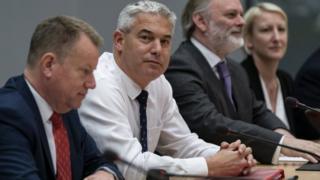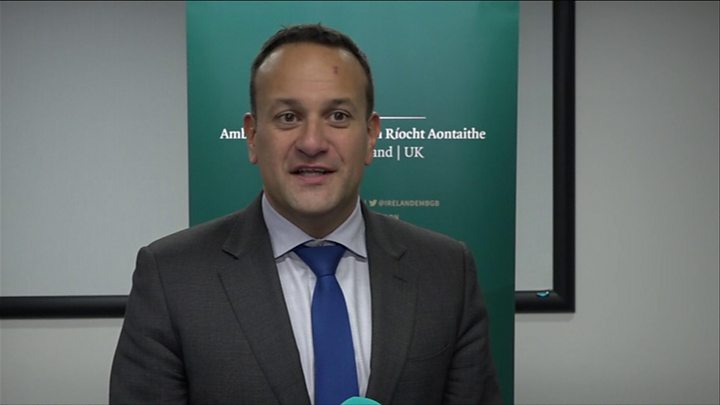Brexit secretary returns to Brussels after ‘promising’ UK-Ireland talks
Brexit Secretary Steve Barclay will meet the EU’s chief negotiator in Brussels on Friday morning. …

 Image copyright EPA
Image copyright EPA Brexit Secretary Stephen Barclay is to meet the EU’s chief negotiator later – after Prime Minister Boris Johnson and his Irish counterpart agreed they could “see a pathway to a possible deal”.
The PM and Leo Varadkar held “detailed and constructive” talks for over two hours on Thursday at a country manor.
Mr Varadkar said the “very positive” meeting in north-west England meant negotiations could resume in Brussels.
Mr Barclay and Michel Barnier will hold talks there later this morning.
It comes ahead of a crunch summit of EU leaders on 17 and 18 October, which is seen as the last chance for the UK and the EU to agree a deal ahead of 31 October Brexit deadline.
Northern Ireland Secretary Julian Smith told BBC NI’s The View he was “delighted to see the positivity that came out of the meeting” between Mr Johnson and Mr Varadkar.
He added: “We do need to compromise, we do need to focus on coming together and having an accommodation.”
Mr Varadkar had earlier refused to be drawn on what “concessions” had been made by either side.
Downing Street has not commented on Irish press reports suggesting “significant movement” has been made by Mr Johnson.
Former Conservative chancellor Lord Norman Lamont, a Brexiteer, said he was not “worried” about the prospect of concessions from the UK government, but wanted to know what they were.
What happened on Thursday?
A day after EU leaders accused the UK of proposing untested ideas, Mr Johnson and Mr Varadkar met for talks that included a one-to-one discussion during a walk in the grounds of Thornton Manor.
Afterwards, Mr Varadkar told reporters the talks were at a “very sensitive stage” but were “very positive and very promising”.
The Taoiseach said he was now “convinced” the UK wanted an agreement, adding: “I do see a pathway towards an agreement in the coming weeks.”
However, there were, he said, still issues over “consent and democracy” and ensuring there is no customs border.
“It remains our position that there can’t be a hard border between north and south,” Mr Varadkar added.

Media playback is unsupported on your device
Downing Street said the talks concentrated on “the challenges of customs and consent”.
“They agreed to reflect further on their discussions and that officials would continue to engage intensively on them.”
“No one’s cracking open the champagne… don’t even pour a pint of warm Guinness,” joked one of the few people familiar with what actually happened on Thursday after talks between Boris Johnson and Leo Varadkar.
Nothing that happened in the privacy of a country house wedding venue on the Wirral means there will be a deal with the EU in the next seven days.
Nothing has made the obstacles in the way of reaching an agreement magically disappear.
But something has changed.
After days of various EU players publicly scorning the UK’s proposals, explaining the objections and lamenting the weaknesses, there is a tangible willingness, on the bloc’s side at least, to see seriously if they can work.
We’ve discussed here so many times why Ireland’s attitude matters so much, so the very public positivity from Mr Varadkar – his “maybe”, instead of “no” to Mr Johnson’s proposals – is extremely important.
What are the PM’s border plans?
Under Mr Johnson’s proposals, which he calls a “broad landing zone” for a new deal with the EU:
- Northern Ireland would leave the EU’s customs union alongside the rest of the UK, at the start of 2021
- But Northern Ireland would continue to apply EU legislation relating to agricultural and other products, if the Northern Ireland Assembly approves
- This arrangement could, in theory, continue indefinitely, but the consent of Northern Ireland’s politicians would have to be sought every four years
- Customs checks on goods traded between the UK and EU would be “decentralised”, with paperwork submitted electronically and only a “very small number” of physical checks
- These checks should take place away from the border itself, at business premises or at “other points in the supply chain”
With three weeks to go until the Brexit deadline, the prime minister continues to insist the UK will leave the EU with or without a deal at the end of the month.
That is despite the so-called Benn Act – passed by MPs last month – demanding he request a delay to the Article 50 deadline from the EU until January 2020 if a deal has not been agreed before 19 October.
Should any new deal be reached between the EU and UK, it will still have to be approved by MPs in Parliament.
Timeline: What’s happening ahead of Brexit deadline?
Monday 14 October – The Commons is due to return, and the government will use the Queen’s Speech to set out its legislative agenda. The speech will then be debated by MPs throughout the week.
Thursday 17 October – Crucial two-day summit of EU leaders begins in Brussels. This is the last such meeting currently scheduled before the Brexit deadline.
Saturday 19 October – Special sitting of Parliament and the date by which the PM must ask the EU for another delay to Brexit under the Benn Act, if no Brexit deal has been approved by Parliament and they have not agreed to the UK leaving with no-deal.
Thursday 31 October – Date by which the UK is due to leave the EU, with or without a withdrawal agreement.





